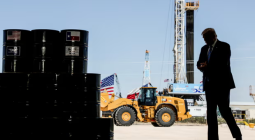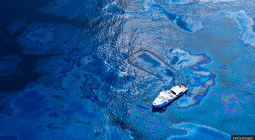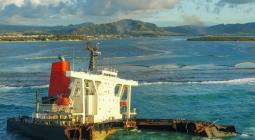Most cleanup companies are owned by politicians, a former Nigerian environment minister told the AP, and correspondence shows similar views were shared by U.N. officials.
It wasn’t supposed to be this way.
There have been thousands of oil spills since Niger Delta production began in the 1950s. Reports and studies document that people often wash, drink, fish and cook in contaminated water.
Spills still occur frequently. In November, the Ogboinbiri community in Bayelsa state suffered its fourth spill in three months, harming fields, streams and fishing.
“We have not harvested anything," said farmer Timipre Bridget, there is now “no way to survive.”
After a major U.N. pollution survey in 2011, oil companies agreed to a $1 billion cleanup fund for the worst-affected area, Ogoniland. Shell, the largest private oil and gas company in the country, contributed $300 million. The U.N. was relegated to an advisory role. The Nigerian government would handle the funds.
But a confidential investigation by U.N. scientists last year found the site outside Port Harcourt was left with a “complete absence of topsoil,” with almost seven times more petroleum remaining than Nigerian health limits allow.
The company responsible had its contract revoked, Nenibarini Zabbey, the current director of Hyprep, told the AP by email.
The head of operations when the contract was awarded, Philip Shekwolo, called allegations in the U.N. documents “baseless" and "cheap blackmail.” Shekwolo, who used to head up oil spill remediation for Shell, insists the cleanup was successful.
But the documents show U.N. officials raising the alarm since 2021, when Shekwolo was acting chief.
A January 2022 U.N. review found 21 of the 41 contractors okayed to clean up spill sites had no relevant experience. These included construction companies and general merchants.
They were effectively handed a “blank check,” U.N. Senior Project Advisor Iyenemi Kakulu is recorded saying in the minutes of a meeting with Hyprep and Shell. Incompetent companies were to blame for bad cleanups, Hyprep’s own communications chief, Joseph Kpobari is in the minutes as having said. Despite this, they were rewarded contracts for more polluted sites, the U.N. delegation warned.
Zabbey denied Kpobari’s admission. He said 16 out of 20 sites in the project’s first stage are certified as clean by Nigerian regulators and many have been returned to communities. Hyprep always issued contracts correctly, he said.
Two sources close to the cleanup efforts, speaking anonymously for fear of loss of business or employment, said when officials visited laboratories used by Hyprep, they lacked equipment needed to perform the tests they reported.
In a letter to customers, one U.K. laboratory frequently used by Hyprep acknowledged its tests for most of 2022 were flawed and unreliable and the U.K. laboratory accreditation service confirmed the lab was twice suspended.
Zabbey says now Hyprep monitors contractors more closely, labs adhere to Nigerian and U.N. recommendations and are frequently checked.
The U.N. also warned the Nigerian government in a 2021 assessment that Hyprep’s spending was not being tracked. Internal auditors were considered “the enemy” and “demonized for doing their job.” Shekwolo’s predecessor as Hyprep chief blocked financial controls and “physically prevented” auditors from checking that work had been completed, it found.
Zabbey responded that the audit team is valued now, and accounts are audited annually, although he provided only one audit cover letter. In it, the accountants “identified weaknesses.”
One Nigerian politician tried to change things: Sharon Ikeazor spent decades as a lawyer before becoming environment minister in 2019.
“The companies had no competence whatsoever,” she said in a phone interview.
In February 2022, she received a letter from senior U.N. official Muralee Thummarukudy, warning of “significant opportunities for malpractice" over contract awards, unusually strong language in U.N. diplomacy. She removed Shekwolo as acting Hyprep chief the next month, explaining that she believed he was too close to the politicians.
Most cleanup companies were owned by politicians, she said. The few competent companies “wouldn’t get the big jobs.”
Shekwolo assessed who was competent for contract awards, Ikeazor said. Shekwolo’s former employer Shell and the U.N. both warned her about him, she said, something Shekwolo says he was unaware of.
Ikeazor asked Shekwolo’s successor to review every suspect contract and investigate the cleanup companies.
“That sent shockwaves around the political class,” she said.
She was quickly replaced as environment minister, with Shekwolo rehired, after just two months out of office.
Shekwolo denied being too close to politicians. He insists no reason was given for his removal and suggested Ikeazor simply didn’t like him.
Last year, the U.N. Environment Programme ended its official involvement in the Nigerian oil spill cleanup, explaining its five-year consultancy was over. Ikeazor said the real reason was U.N. frustration over corruption, and the two sources close to the project concurred.
Zabbey said he believes the U.N. merely changed its goals and moved on.





